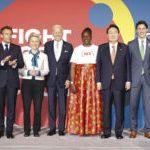World leaders pledge billions to fight AIDS, tuberculosis, malaria on UN sidelines

UNITED NATIONS/NEW YORK — The Global Fund to fight AIDS (acquired immunodeficiency syndrome), tuberculosis and malaria on Wednesday reached $14.25 billion pledged as world leaders seek to fight the killer diseases after progress was knocked off course by the coronavirus disease 2019 (COVID-19) pandemic.
US President Joseph R. Biden, Jr., who hosted the conference in New York on the sidelines of the annual high-level meeting of the United Nations General Assembly, said the funding is crucial to combating the diseases.
“This is an investment that will save another 20 million lives, reduce mortality from these diseases another 64% in the next four years,” Mr. Biden said.
The United States had previously said it would pledge $6 billion for the next funding cycle.
The fund, a public/private alliance based in Geneva, is seeking $18 billion for its next three-year funding cycle from governments, civil society and the private sector. Before Wednesday’s conference, it had already raised more than a third of the total.
The Global Fund said the $14.25 billion figure is likely to increase as more donations are expected.
“For the government and people of Malawi, this is not a conference but a life saver,” Lazarus Chakwera, the president of Malawi, said earlier in the day, pledging $1 million.
According to UNAIDS, there were 990,000 adults and children in Malawi living with HIV in 2021, and USAID says that tuberculosis is a “major public health problem in Malawi.”
European Commission chief Ursula von der Leyen pledged 715 million euros ($703.63 million) to the fund, which she said was an increase of 30% from its previous pledge.
“We can cure tuberculosis. We can prevent malaria. We can fight these terrible diseases. We will end AIDS, we will end tuberculosis, we will end malaria — once and for all,” she said.
French President Emmanuel Macron pledged another 300 million euros, bringing France’s total contribution for the funding period to 1.6 billion euros.
Nigeria pledged $13.2 million, the Netherlands pledged 180 million euros and Indonesia pledged $15.5 million, alongside private sector pledges.
In its 2022 report, the fund said the reach of its treatment and prevention efforts rebounded last year after declining for the first time in almost 20 years in 2020, but the world is still not on track to defeat these diseases.
The fund estimates its work has saved around 50 million lives since its inception in 2002.
But in 2020, the numbers treated for tuberculosis fell by 19%, to 4.5 million. In 2021, this went back up by 12%, to 5.3 million — still just below the 5.5 million pre-pandemic number.
While malaria and AIDS programs did exceed 2019 levels, the pandemic’s impact means they are still off-track from ending the diseases by 2030.
The Fund has also warned the war in Ukraine and the global food crisis could exacerbate the situation. Infectious diseases are usually much deadlier for people whose bodies are weakened by malnutrition, and they also do not respond as well to treatment or prevention efforts. — Reuters
